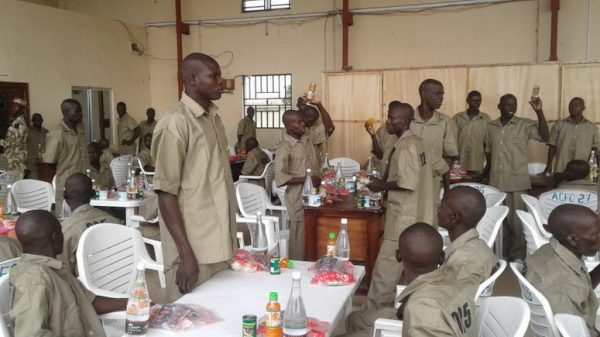Headlines
Senate considers bills for army ‘varsity in Borno, agency for ‘Boko Haram repentants’

BY OUR EDITOR
The Senate has begun moves to establish a Nigerian Army University in Borno State and an agency of government to superintend over the affairs of ‘repentant Boko Haram’ members.
Both bills passed the first reading on the floor of the Senate on Thursday.
The bill for the establishment of the Nigerian Army University which would be sited at Biu, Borno State, is sponsored by the former Senate Leader and Chairman, Senate Committee on Army, Senator Ali Ndume (APC, Borno South).
According to the bill titled, ”Nigerian Army University Biu (Est, etc) Bill, 2020 (SB.331), the university shall be a training institution for the development of middle and high-level manpower in the areas of technological empowerment for civilians, appreciation for military policy; logistics and strategy.
The bill further stressed that the University when established shall be supervised by the Federal Ministry of Education and shall through the National Universities Commission be responsible for approving and regulating all academic programmes run in University.
The university when approved would ensure quality compliance and provide funds for academic and research programmes, infrastructures and remunerations of employees.
The bill read, “No person shall be required to satisfy requirements as to race, including ethnic grouping, sex, place of birth, family origin, religious or political persuasion, as a condition for becoming or continuing to be a student in the University.
“No person shall be subjected to any disadvantage or accorded any advantage in relation to the University.”
The Senate also wants to establish a rehabilitation, de-radicalization and integration agency that would see to the repentant insurgents in the country.
READ: Military releases 1,400 ‘repentant’ Boko Haram suspects
The bill, sponsored by Ibrahim Gaidam of Yobe East senatorial district, is said to have already become a subject of controversy, as it is perceived to offer concession to Boko Haram militants who choose to cease fire.
Last month, the Nigerian military said no fewer than 608 repentant Boko Haram insurgents were undergoing the De-radicalisation, Rehabilitation and Reintegration (DRR) programme under its Operation Safe Corridor in Malam-Sidi, Gombe State.
Clients, the military euphemism for the repentant insurgents, were said to have been exposed to formal literacy classes, skills acquisition and Islamic Religious Knowledge (IRK) as well as drug and psycho-therapists during their training.
A group of Borno elders, led by ex-governor Kashim Shettima, last year, had frowned at the initiative, saying the military’s operation was not well thought out. They feared that releasing the purported repentant Boko Haram militants into civilian population could be counterproductive as hardened fighters would return to the terror group to commit more atrocities.
“The ongoing de-radicalization and reintegration of repentant Boko Haram insurgents under the ‘Operation Safe Corridor’ of the defence headquarters is a course for concern for members of the Civilian JTF and some stakeholders in the State,” the group wrote in a letter last year.
“(We) suspect that “Boko Haram members do not repent” hence the de-radicalization programme may be breeding spies and agents of recruitment for the Boko Haram,” they had said.
They urged the president to approve the suspension of the programme.
More Nigerians have also spoken out against the policy.
